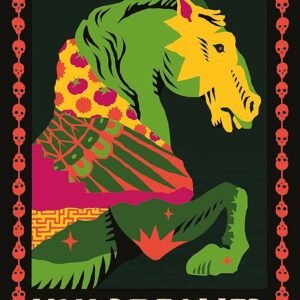Martyr

Kaveh Akbar’s Martyr! is a remarkable debut novel that merges the deeply personal with the universally human. The novel’s protagonist, Cyrus Shams, is a 27-year-old Iranian American poet who is navigating the turbulent waters of grief, addiction, and the quest for self-understanding. The story is intricately woven around Cyrus’s internal struggles, as well as his external search for meaning following the deaths of his parents, and his confrontation with his own identity. Akbar’s novel explores the burden of history and the search for redemption, while also examining themes of love, loss, and cultural identity.
The novel opens with Cyrus grappling with sobriety and a profound sense of disillusionment. His mother, Roya, died in the tragic 1988 Iran Air Flight 655 incident, and his father, Ali, died in the years after. These losses are central to Cyrus’s identity, and the novel’s exploration of them delves into the pain of unresolved grief. Akbar uses this personal tragedy to frame the larger thematic concern of how we carry the weight of history and identity throughout our lives. This journey of self-discovery takes Cyrus from his suburban American life to a more surreal, philosophical exploration where the past meets the present.
Cyrus’s quest for understanding takes on a poignant and somewhat surreal turn when he becomes obsessed with Orkideh, an Iranian artist who is terminally ill and staging her final performance at the Brooklyn Museum. Their interaction is not only a direct connection between Cyrus and his heritage, but it also catalyzes his intellectual and spiritual evolution. The performance itself, paired with Orkideh’s final act, becomes an existential symbol of how we reckon with both the past and the future, and how we seek to shape meaning even when faced with mortality.
Akbar’s lyrical writing is one of the novel’s strongest attributes. His poetic sensibility permeates the narrative, infusing it with a sense of weightiness and intensity that elevates the story beyond a simple narrative of personal loss. Akbar’s prose is both beautiful and devastating, blending melancholy with insight in ways that demand a deeper, more contemplative reading. His mastery of language allows him to explore abstract and difficult concepts—like the nature of martyrdom, the meaning of art, and the burden of inherited trauma—while keeping the emotional immediacy of the novel grounded.
Martyr! also reflects Akbar’s ability to tackle themes of Iranian American identity. As a child of immigrants, Cyrus is caught between two worlds: the rich, historical heritage of Iran and the complex reality of living as an immigrant in America. His relationship with this duality forms a significant part of his character development throughout the novel. Akbar thoughtfully examines how cultural displacement can complicate one’s sense of belonging, as Cyrus is never quite at home in either world. The book addresses the tensions of navigating between cultures, as well as the internal conflicts of someone caught between two identities that can never fully reconcile.
Critics have praised Martyr! for its complexity and emotional resonance. The New York Times Book Review described the novel as “incandescent,” highlighting the raw vulnerability and intelligence of Cyrus Shams as a protagonist. His emotional journey is both relatable and deeply specific, as Akbar captures the nuances of grief, recovery, and spiritual exploration in a way that speaks to readers across cultural lines. His prose “has the musculature of poetry,” as The New Yorker notes, suggesting that Akbar’s background as a poet plays a crucial role in shaping the novel’s distinct narrative style.
The novel also draws attention to the philosophical underpinnings of Cyrus’s journey. The intellectual and literary references throughout the book—many of them stemming from Akbar’s own poetic sensibility—invite readers to consider deeper questions about existence, purpose, and the meaning of life. Akbar has written a novel that does not simply tell a story, but rather, engages with readers on an intellectual and emotional level, questioning how we make sense of pain, the search for meaning, and the role of art in bridging the gap between our lives and our understandings of the world.
In addition to its literary strength, Martyr! is also deeply resonant on a human level. At its core, the novel is about searching for redemption and grappling with the weight of one’s own identity. It raises questions about the nature of martyrdom—not just in a religious or political sense, but as a broader existential concept. Cyrus’s struggles with his addiction, the loss of his parents, and the complexities of his cultural identity form a narrative that speaks to the universal experience of confronting one’s past in order to build a future.
In conclusion, Martyr! is a stunning achievement from Kaveh Akbar. The novel is a delicate, multilayered exploration of personal history, cultural identity, and the human experience. Akbar’s lyrical prose, intellectual depth, and emotional insight combine to make Martyr! a novel that is not only a powerful reflection on the self but also an invitation to explore the nature of memory, grief, and the ongoing search for meaning. This book will resonate deeply with anyone who has faced loss, confronted identity, or sought to understand the complexities of their own place in the world. Akbar’s talent as both a poet and a novelist is evident, and this book marks him as one of the most exciting voices in contemporary literature.



